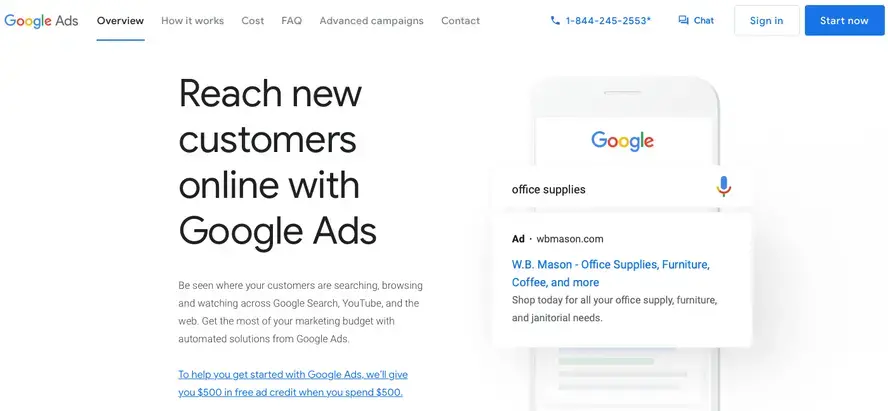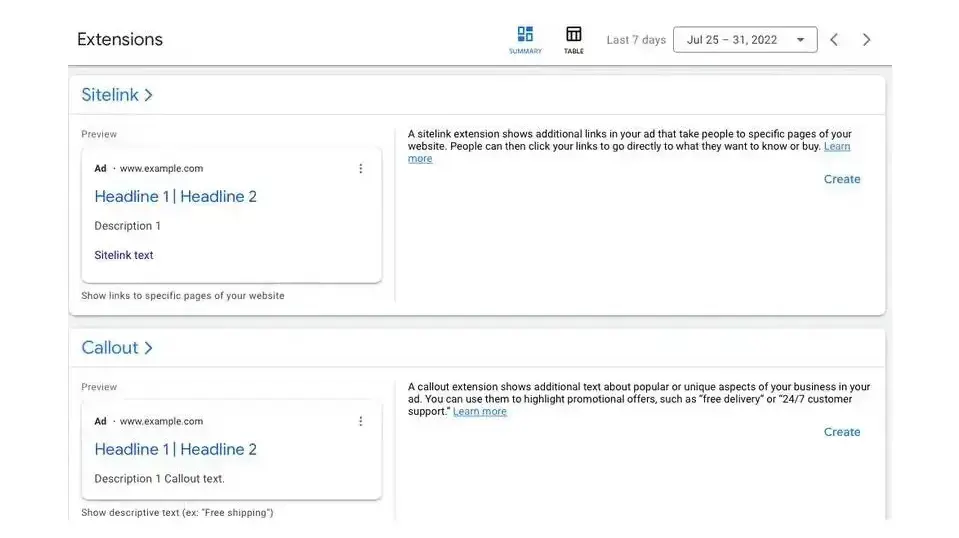If you're not using ad extensions in Google Ads, you're missing out on a big opportunity to improve your campaign performance. Ad extensions provide additional information about your business that can help improve click-through rates and conversion rates.

There are many different types of ad extensions available, so you can choose the ones that best fit your business goals. In this article, we'll take a look at some of the most popular ad extension types and how they can benefit your campaign.
Types of Ad Extensions You Should Know About
There are many different types of ad extensions available in Google Ads. Here are some of the most popular ones:
Location Extensions
Location extensions provide your business address and phone number in your ad, so potential customers can easily find you. This is a great way to improve click-through rates for local searches.Call Extensions
Call extensions allow potential customers to call your business directly from your ad with just one click. This is a great way to increase conversion rates for mobile searchers who may be ready to buy.Site Links Extensions
Site links extensions provide additional links to other pages on your website, so potential customers can easily find more information about your product or service. This also improves click-through rates and keeps potential customers engaged with your site.Product Extensions
Product extensions provide additional information about your product, such as price, availability, or features. As you can imagine, this improves conversion rates for potential customers who are ready to buy.Structured Snippets
Structured snippets provide additional information about your business, such as your services or products.Lead Form Extensions
Lead form extensions allow potential customers to fill out a form with their contact information so you can follow up with them.Price Extensions
Price extensions provide your product or service price in your ad, so potential customers can easily see how much it costs. This is a great way to improve conversion rates for potential customers who are ready to buy.App Extensions
App extensions provide a link to your app, so potential customers can easily download it. This is a great way to increase conversion rates for mobile searchers who may be ready to download or buy an app on sight.
These are just a few of the most popular ad extension types. There are many others available, so be sure to experiment to find the ones that work best for your business goals.
7 Reasons to Use Ad Extensions in Google Ads
Ad extensions provide additional information that can help improve click-through rates and conversion rates. They also give you more control over the message you're delivering to potential customers. In addition, ad extensions can help you save money by reducing your cost-per-click.
Let's explore each of these concepts in further detail now.
Reason 1: Ad Extensions Can Improve Click-Through Rates
Ad extensions provide additional information about your business, product, or service that can help improve click-through rates. For example, location extensions provide your business address and phone number, so potential customers can easily find you. Call extensions allow potential customers to call your business directly from your ad. And site links extensions provide additional links to other pages on your website.
All of these things can help improve click-through rates because they give potential customers more reasons to click on your ad. In addition, ad extensions can also help improve the quality score of your ad, which can lead to lower costs-per-click and improved ad position.
Better click-through rates means more potential customers are seeing your ad and taking action. This can lead to more website visitors, more leads, and more sales.
Reason 2: Ad Extensions Can Increase Conversion Rates
Ad extensions can also help increase conversion rates. For example, call extensions allow potential customers to call your business directly from your ad. This is a great way to increase conversion rates for mobile searchers who may be ready to buy. And then there are product extensions, which can also help increase conversion rates by providing additional information about your product, such as price, availability, or features.
Additionally, location extensions can help increase conversion rates by providing your business address and phone number, as you already know. Lastly, review extensions can help increase conversion rates by showing potential customers what others are saying about your product or service.
All of these things can help increase conversion rates because they give potential customers more reasons to buy from you.
Reason 3: Ad Extensions Give You More Control Over The Message You Deliver
Ad extensions give you more control over the message you deliver to potential customers. For example, if you're running a sale, you can use ad extensions to highlight the discount in your ad. Or if you have a new product or service, you can use ad extensions to provide additional information about it. You can use call extensions to highlight a new phone number, and you can use location extensions to provide a new address. Or location extensions to provide additional information about your business, product, or service.
And still another example comes from site link extensions, which give you the ability to send potential customers to specific pages on your website. This can be a great way to control the message and ensure that potential customers see the information that you want them to see.
This ability to control the message you're delivering can be a great way to improve click-through rates and conversion rates, too.
Reason 4: Ad Extensions Can Help You Save Money
Ad extensions can also help you save money by reducing your cost-per-click. This is because ad extensions can help improve the quality score of your ad, which can lead to lower costs-per-click and improved ad position.
Or to put in another way, ad extensions can help improve your ad's quality score by providing additional information that can help improve click-through rates and conversion rates. This, in turn, can lead to lower costs-per-click.
Better quality scores mean you'll pay less per click, and improved ad position means your ad will be seen by more potential customers. Both of these things can lead to more website visitors, more leads, and more sales.
Reason 5: Ad Extensions Are Easy To Use
Ad extensions are easy to use. You can create them yourself using the Google Ads interface. Or you can ask your Google Ads representative to help you set them up. To do this, simply go to the Ads & Extensions > Extensions, and then click on the type of extension you want to create.

Enter the necessary information, such as your business name, address, and phone number. Then preview your ad to see how it will look. Once you're happy with it, save your changes and your ad extension will be live.
Once they're set up, ad extensions will automatically appear on your ads when they're eligible to do so. This is a great way to improve click-through rates and conversion rates without having to spend a lot of time or money on creating new ads.
Reason 6: Ad Extensions Are Versatile
There are many different types of ad extensions available, so you can choose the ones that are most relevant for your business goals. And as we’ve already established, they’re super easy to create, configure, and launch.
Reason 7: Ad Extensions Work For All Types Of Businesses
Ad extensions work for all types of businesses, from small businesses to large enterprises. They effectively improve click-through rates and conversion rates for any type of company across all industries. It truly doesn’t matter.
For instance, if you're a small business that sells products solely online, you can use product extensions to provide additional information about the specialty items you sell. Or if you're a large enterprise with multiple locations, you can use location extensions to provide directions and contact information for each location.
Or to be even more specific, if you’re in the soap-making industry, you can use ad extensions to provide further details about the ingredients in your hand-crafted soaps.
And if you're in the travel industry, location extensions can help you increase click-through rates and conversion rates by providing directions and contact information for each of the destinations you’d like to promote.
No matter what type of business you have, ad extensions can help you achieve your marketing goals.
Tools and Resources for Getting Started with Ad Extensions
Now that you know the benefits of ad extensions and how they can help you achieve your marketing goals, it's time to get started. Here are a few tools to help you get started with ad extensions:
- About Image Extensions
This is a great resource for finding inspiration and ideas for ad extensions. The gallery provides examples of how different businesses are using ad extensions to improve click-through rates and conversion rates.
- The Google Ads Playbook
This playbook is a step-by-step guide that walks you through the process of creating ads and using ad extensions. It includes best practices, tips, and tricks for getting the most out of ad extensions. It’s linked here as a downloadable PDF.
Now that you know the benefits of ad extensions and how to get started with them, it's time to put them to work for your business.
Use Ad Extensions in Google Ads Now
Ad extensions are a great way to improve click-through rates, conversion rates, and the quality score of your ad. They also give you more control over the message you're delivering to potential customers. So if you're not already using ad extensions, be sure to give them a try.
And of course, if you’re in the market for superior web hosting , we’ve got you covered.
Frequently Asked Questions
How do I promote my web hosting site?
To promote your web hosting site, guest post on popular niche sites, consider an affiliate program, offer a free-info product on your site, build a free email web hosting marketing list, and create relevant and valuable content.
How do DIY blogs make money?
Some ways you can make money from your DIY blog include sponsored content, direct sales, advertising space, ad networks, affiliate programs, and so on.
Which method is right for my business?
Generally speaking, small businesses, and those managing just one website, will want to try shared hosting. While entrepreneurs looking to build their own hosting business should sign up as resellers.
How much does a WordPress blog cost?
One of the main costs for running a WordPress blog is hosting, while other common costs include domains if they aren’t included in the hosting package and paid themes and plugins. WordPress pricing is between $11 and $40 per month.

Brenda Barron is a freelance writer and editor living in southern California. With over a decade of experience crafting prose for businesses of all sizes, she has a solid understanding of what it takes to capture a reader's attention.
View all posts by Brenda Barron



















